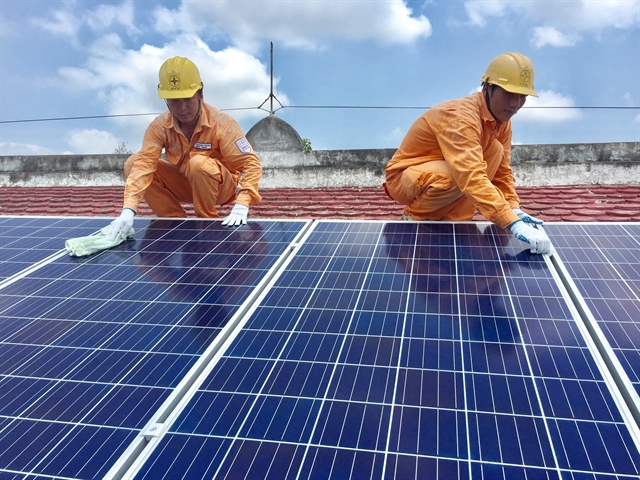The northern province of Bac Giang is striving to have 50% of local houses installed with rooftop solar panels by 2030 under a plan to enhance electricity savings in 2023-2025 and the following years.
The plan aims to ensure a stable power supply and safety of the power system, creating a solid foundation for economic development and maintaining security and social stability in the region.
In the plan, the province sets a goal of saving at least 2% of the total annual electricity consumption in the 2023 - 2025 period.
By the end of 2025, 100% of the street lighting system will use LED lights, and by 2030, 50% of local office buildings and houses equipped with rooftop solar power systems for self-consumption. The power loss in the electricity system in the province will be reduced to less than 3.5% by 2025.
Bac Giang aims to save at least 5% of their annual electricity consumption.
Besides, the province will focus on implementing solutions to improve people's behaviour regarding electricity saving. Energy-saving technical solutions and models will be applied in offices, schools and medical facilities, towards saving at least 5% of their annual electricity consumption.
Bac Giang authority will also take measures to save electricity in public lighting, advertising lighting, and outdoor decorations such as automation technology and replacing conventional lights with energy saving ones, aiming to ensure a minimum saving of 30% of total electricity consumption in the field in the 2023 - 2025 period.
The company has called on big power consumers to agree on a suitable reduction plan when it is necessary to adjust the load.
Earlier in June, Deputy Prime Minister Tran Hong Ha signed the Prime Minister's Directive No. 20/CT-TTg on increasing electricity savings during the 2023 - 2025 period and subsequent years.
Accordingly, the directive requested that during the 2023 - 2025 period and subsequent years, the entire country strives to save a minimum of 2% of total electricity consumption each year, reduce electricity losses on the entire power system to below 6% by 2025, and decrease the peak load capacity of the national power system through the implementation of the Demand-Side Management (DSM) and Demand Response (DR) programmes, by at least 1,500 MW by 2025.
By 2030, the goal is to have half of office buildings and half of residential buildings equipped with rooftop solar power systems for self-consumption, without selling electricity back to the national power grid. By the end of 2025, the aim is to have all street lighting systems use LED lights.
To that end, ministries, ministry-level and government agencies, People's Committees of centrally-run cities and provinces, businesses and mass organisations were assigned to save electricity in workplaces, public lighting, lighting for advertising purposes, and outdoor decorations, households, commercial and service establishments, and manufacturing companies.
The Ministry of Industry and Trade was also tasked with building and launching programmes to promote rooftop solar power in businesses and households, as well as promoting the use of energy-saving equipment in households such as air conditioners, refrigerators, LED lights, and washing machines.
The Vietnam Electricity (EVN) Group must optimise the operations of power plants and distribution grids to efficiently utilise primary energy sources and reduce electricity losses throughout the systems./.
According to Vietnam News Agency









 Energy Efficiency and Conservation: Technology as the “Key”
Energy Efficiency and Conservation: Technology as the “Key”
 Energy-saving solutions and green transition promotion
Energy-saving solutions and green transition promotion
 Opening of the 2025 Energy-Efficient Equipment and Green Transition Exhibition Fair
Opening of the 2025 Energy-Efficient Equipment and Green Transition Exhibition Fair
 Consultation on the methodology for developing and updating energy consumption standards for four major industrial sectors
Consultation on the methodology for developing and updating energy consumption standards for four major industrial sectors
 Develop sales and marketing strategies for energy efficiency equipment and solution suppliers
Develop sales and marketing strategies for energy efficiency equipment and solution suppliers
 The 9th VEPG Steering Committee Meeting: Strengthening Coordination for Viet Nam’s Just Energy Transition
The 9th VEPG Steering Committee Meeting: Strengthening Coordination for Viet Nam’s Just Energy Transition